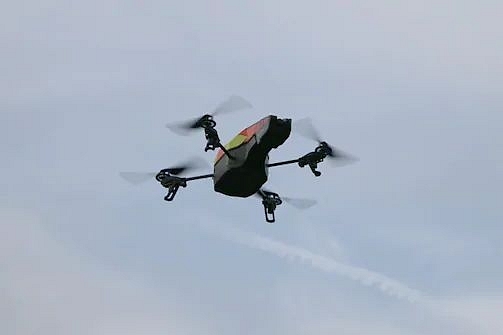
Railways Deploys ‘An Eye In The Sky’ To Strengthen Security
Indian Railways introduces drone-based surveillance systems to strengthen security.
In an effort to keep a close watch on rail premises including tracks, Indian Railways has introduced drone-based surveillance systems to strengthen the security.
The Mumbai division of the railways has recently procured two Ninja UAVs for better security and surveillance on station areas, track sections, yards and workshops among other rail properties.
Drone surveillance technology has emerged as an important and cost-effective tool for security surveillance over large areas with limited manpower.
Using the latest technology, the railways aims to provide a force multiplier and aid to the effectiveness of the security personnel deployed in the area.
A team of four staff members of Railway Protection Force (RPF) in Mumbai has been trained for flying drone, surveillance and maintenance. The drones are capable of real time tracking, video streaming and may be operated on ‘automatic fail safe mode’.
RPF has planned extensive use of drones for the purpose of railway security. Nine drones have been procured by RPF so far at a cost of Rs 31.87 lakh at South Eastern Railway, Central Railway, Modern Coaching Factory, Raebareli, and South Western Railway.
It is further proposed to procure 17 drones in future at a cost of Rs 97.52 lakh. Nineteen RPF personnel have so far been trained in operation and maintenance of drones out of which four have received licences for flying drones. Six more RPF personnel are being trained.
It can be used to launch surveillance on criminal and anti-social activities like gambling, throwing of garbage, hawking etc in the railway premises. It may be deployed for data collection analysis which may prove to be extremely useful in vulnerable sections for safe operations of trains.
The drone may be pressed into service at disaster sites for helping in rescue, recovery and restoration and coordinating the efforts of various agencies. It is very useful while undertaking mapping of railway assets to assess the encroachments on railway property.
During large scale crowd management efforts, it may give vital inputs like crowd magnitude, probable time of arrival and dispersal based on which crowd regulation efforts may be planned and executed. Drones were used to enforce lockdown and monitor the movement of migrants during the Covid-19 lockdown.
A drone camera can cover a large area which requires 8-10 RPF personnel. Thus, it may lead to substantial improvement in utilisation of scarce manpower. Drone beats have been designed based on railway assets, sensitivity of area, activity of criminals etc.
Drone acts as an ‘eye in the sky’ and monitors the whole area. Any suspicious activity, if noticed, is intimated to the nearest RPF post of division to catch the criminal. One such criminal was arrested on a real time basis in Wadibunder Yard area while he was trying to steal inside a railway coach stationed at the yard.